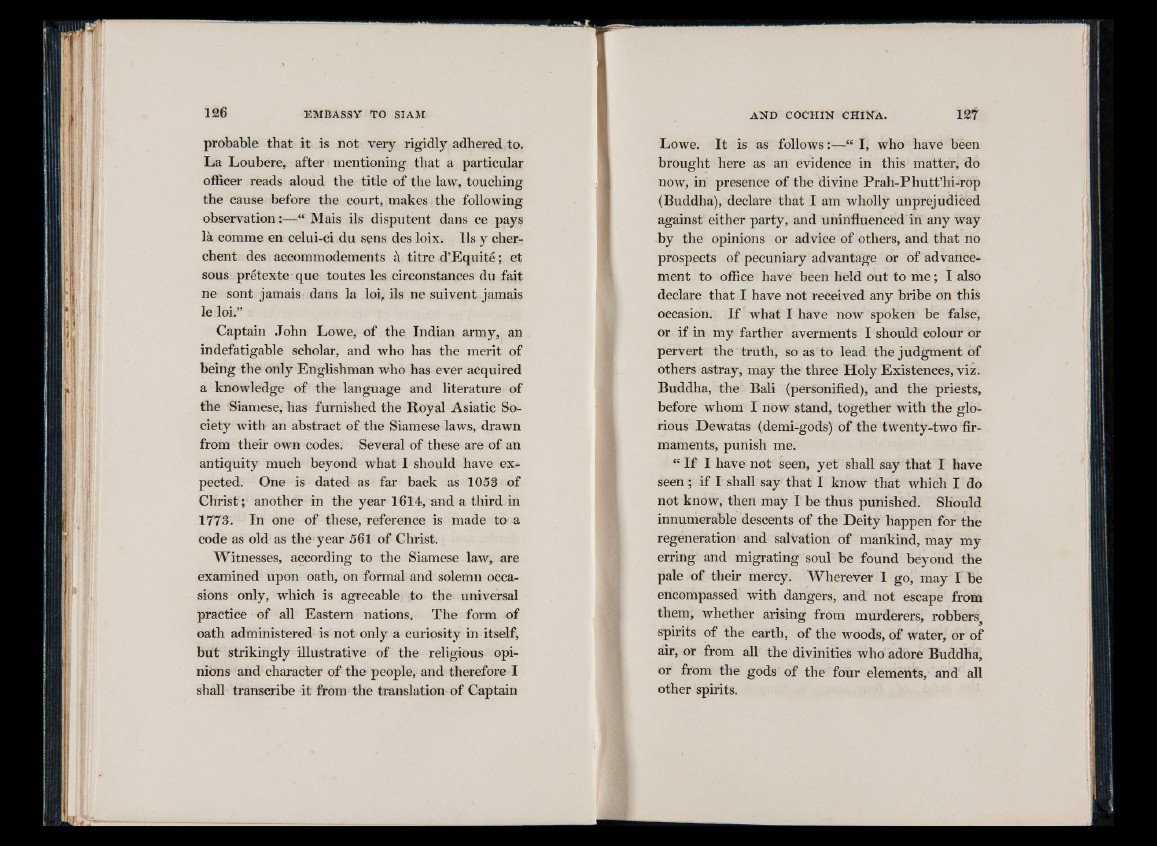
probable that it is not very rigidly adhered to.
La Loubere, after mentioning that a particular
officer reads aloud the title of the law, touching
the cause before the court, makes the following
observation :—“ Mais ils disputent dans ce pays
là comme en celui-ci du sens des loix. Ils y cherchent
des accommodements à titre d’Equité ; et
sous prétexte que toutes les circonstances du fait
ne sont jamais dans la loi, ils ne suivent jamais
le loi.”
Captain John Lowe, of the Indian army, an
indefatigable scholar, and who has the merit of
being the only Englishman who has ever acquired
a knowledge of the language and literature of
the Siamese, has furnished the Royal Asiatic Society
with an abstract of the Siamese laws, drawn
from their own codes. Several of these are of an
antiquity much beyond what I should have expected.
One is dated as far back as 1053 of
Christ ; another in the year 1614, and a third in
1773. In one of these, reference is made to a
code as old as the year 561 of Christ.
Witnesses, according to the Siamese law, are
examined upon oath, on formal and solemn occasions
only, which is agreeable to the universal
practice of all Eastern nations. The form of
oath administered is not only a curiosity in itself,
but strikingly illustrative of the religious opinions
and character of the people, and therefore I
shall transcribe it from the translation of Captain
Lowe. I t is as follows:—“ I, who have been
brought here as an evidence in this matter, do
now, in presence of the divine Prah-Phutt’hi-rop
(Buddha), declare that I am wholly unprejudiced
against either party, and uninfluenced in any way
by the opinions or advice of others, and that no
prospects of pecuniary advantage or of advancement
to office have been held out to m e ; I also
declare that I have not received any bribe on this
occasion.; If what I have now spoken be false,
or if in my farther averments I should colour or
pervert the truth, so as to lead the judgment of
others astray, may the three Holy Existences, viz.
Buddha, the Bali (personified), and the priests,
before whom I now stand, together with the glorious
Dewatas (demi-gods) of the twenty-two firmaments,
punish me.
“ If I have not seen, yet shall say that I have
seen ; if I shall say that I know that which I do
not know, then may I be thus punished. Should
innumerable descents of the Deity happen for the
regeneration and salvation of mankind, may my
erring and migrating soul be found beyond the
pale of their mercy. Wherever 1 go, may I be
encompassed with dangers, and not escape from
them, whether arising from murderers, robbers^
spirits of the earth, of the woods, of water, or of
air, or from all the divinities who adore Buddha,
or from the gods of the four elements, and all
other spirits.